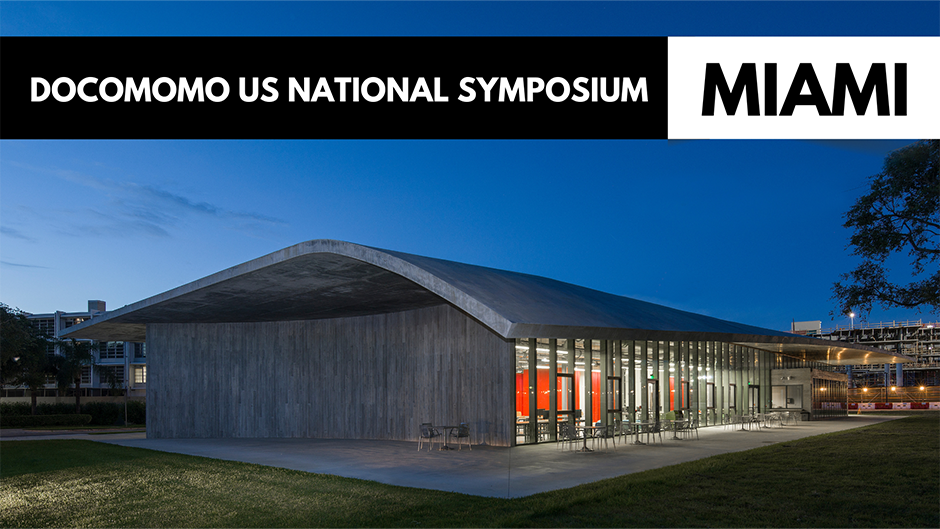Founded in the United States in 1995, Docomomo-US (Do-cumenting / Co-nserving / Mo-dern / Mo-vement) is a non-profit international organization led by a national Board of Directors and staff that represents a union of regional chapters which share its members’ knowledge of and enthusiasm for modern architecture and design. The organization advocates for a world where people value modern heritage—architecture, landscapes, and design—and use it to shape vibrant communities. Committed to the principle that modern design merits the attention and preservation received by earlier periods, Docomomo-US and its Florida-based division maintain a continuous and constructive dialogue with national, state, and local preservation authorities and organizations as well as with building owners, developers, and designers in many disciplines. The discussions with designing architects are based on the conviction that creative design and preservation go hand in hand. Docomomo-US promotes the exchange of knowledge about this important legacy which extends from the planned city and the iconic monument to the house next door.
Docomomo-US will hold its 2024 symposium in Miami, more precisely at the School of Architecture on the Coral Gables campus of the University of Miami Wednesday, May 29 through Saturday, June 1. The symposium will feature notable speakers from the School of Architecture faculty, including Prof. Carie Penabad and Prof. Allan Shulman. Additionally, several faculty members will serve as moderators, including Prof. Victor Deupi, Prof. Sophie Juneau, Prof. Jean-Francois Lejeune, Prof. Ricardo Lopez, Prof. Allan Shulman, and Prof. Charlotte Von Moos. A highlight of the symposium is the uniquely crafted tours that provide access to sites typically not open to the public, guided by expert faculty and community guides. An exhibition titled, IN FIFTY FOUR DETAILS will be showcased, featuring hand-drawn detail drawings of postwar architecture. These drawings were produced by freshman architecture students at the University of Miami School of Architecture as part of the design studio course 'Elements of Architecture,' coordinated by Prof. Charlotte Von Moos.
The symposium, hosted by the Florida chapter, will focus on two architectural fronts. The first will be the postwar period, when the Miami area witnessed a great surge in population growth and construction of new buildings (from hotels to Pacesetter houses), with several regionalist responses to the International Style flourishing in tandem. Miami became a laboratory to explore new urban patterns, new building types, evolving aesthetics, and emerging environmental consciousness. The 1980s marked another critical moment, with the rise of postmodernism—marked in South Florida with a combination of modern vernacular, simplified Mediterranean, and futurist-inspired structures ranging from single-family houses to condominiums. In that sense, South Florida is the perfect location to explore streams of postwar modernity as well as the much less investigated postmodern landmarks, many of which are under threat of demolition as they are often not old enough to be designated landmarks by the local historic preservation boards—one critical example being the Dade County Cultural Center by Philip Johnson & John Burgee (1980-84).
Docomomo-US will promote a broader understanding of the accomplishments of postwar to postmodern architecture and culture in regionally specific contexts such as South Florida and the Caribbean. Among the themes to be debated will be tropical brutalism, postwar campus planning in the (sub)tropics, postwar tourism, “Criminal Modern” such as urban renewal and Interstate infrastructure, the “Pink Revolution” or Modern Architecture and Popular Culture in South Florida, Polychrome Modern & the Integration of the Arts. Considering the highly contested legislative initiatives in Florida (such as the law HB423), participants will discuss the impact of climate change on the future of coastal communities in general and analyze how the forces of real estate development, often with the support of local and state governments, might be taking advantage of the new climatic conditions to limit the people’s ability to preserve their heritage—as currently happening in Coral Gables with the threatened Browning Parker’s Pacesetter house of 1965. Open to architects, planners, academic members, students, as well as neighborhood groups and urban activists, the aim of the conference is to offer a platform for discussion and debate on how to foster a culture of “identity instead of demolition” in South Florida.
In conjunction with this exciting event, the University of Miami School of Architecture will be highlighting the Historic Preservation and Adaptive Reuse program as part of its revamped Master of Science in Architecture.
This new graduate program provides a unique setting and structure to train the conservation experts of the future and builds on Miami and South-Florida as an outstanding laboratory to study, restore, and reuse structures dating mostly from the 20th century, from Mediterranean Revival to Art Deco to Tropical Brutalism. A connection to the school’s Rome Program provides not only access to important actors and associations involved in preservation in Europe, with their unrivalled technical and historic competence, but allows comparisons with the Italian capital’s oftentimes underestimated built heritage of the 20th century.
Join us at the Docomomo-US symposium to gain insights from leading professionals and consider enrolling in our graduate program to advance your expertise in historic preservation and adaptive reuse. For more information about the Docomomo event and the Master of Science in Architecture program, please visit our website.

